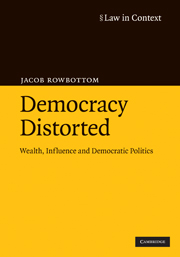Book contents
- Frontmatter
- Contents
- Preface and acknowledgements
- 1 Political equality, wealth and democracy
- 2 Freedom to speak and freedom to spend
- 3 Strategies and reforms
- 4 Access, influence and lobbying
- 5 Beyond equal votes: election campaigns and political parties
- 6 Public spaces, property and participation
- 7 The mass media: democratic dreams and private propagandists
- 8 Participation in the digital era: a new distribution?
- 9 Conclusion
- Index
- References
6 - Public spaces, property and participation
Published online by Cambridge University Press: 05 June 2012
- Frontmatter
- Contents
- Preface and acknowledgements
- 1 Political equality, wealth and democracy
- 2 Freedom to speak and freedom to spend
- 3 Strategies and reforms
- 4 Access, influence and lobbying
- 5 Beyond equal votes: election campaigns and political parties
- 6 Public spaces, property and participation
- 7 The mass media: democratic dreams and private propagandists
- 8 Participation in the digital era: a new distribution?
- 9 Conclusion
- Index
- References
Summary
Many forms of political activity, such as lobbying, contributing to a political party and using the mass media, require substantial resources. This chapter will, however, look at assemblies and other expressive activities in public spaces, forms of participation thought to be accessible regardless of wealth. These forms of participation include marching through the streets, static assemblies, handing out leaflets or collecting signatures for a petition. They have had a long tradition as a vehicle for large-scale political dissent in the UK, with examples ranging from the Chartists in the nineteenth century, to the more recent campaigns against the war in Iraq, the ban on fox-hunting and the anti-capitalist movement. Such activities perform a range of functions, which include showing strength of feeling, gaining publicity, collecting signatures for a petition and distributing information.
Expressive activities in public places have qualitative differences from other types of political participation, for example by facilitating face-to-face contact. While a newspaper report may convey information and opinions, face-to-face communications allow people to see those affected by a particular policy and those holding a particular view. This contact can emphasise how some issues are close to home. For example, if a town council closes a facility, then a peaceful protest on nearby land can remind people of the impact of that decision on the local community. The transparency of assemblies, where the audience can see the individuals participating, makes fake ‘astroturfing’ campaigns more open to detection.
Information
- Type
- Chapter
- Information
- Democracy DistortedWealth, Influence and Democratic Politics, pp. 143 - 170Publisher: Cambridge University PressPrint publication year: 2010
